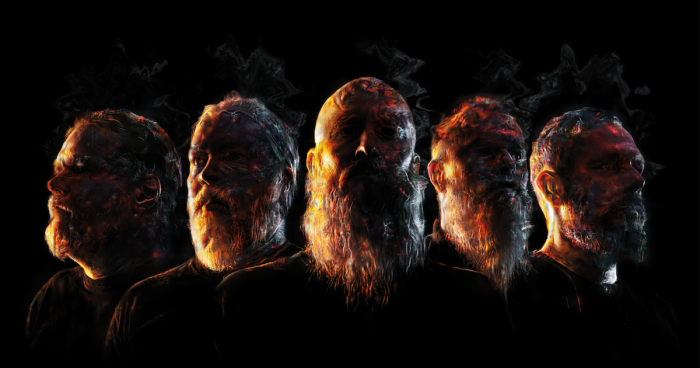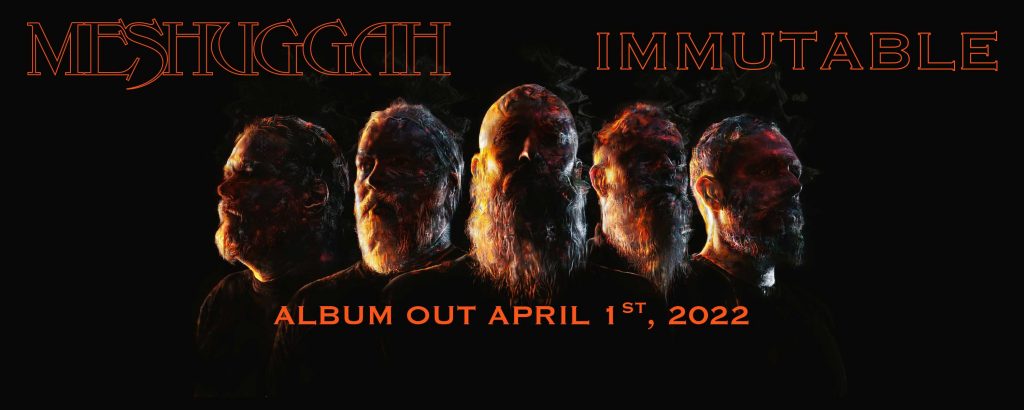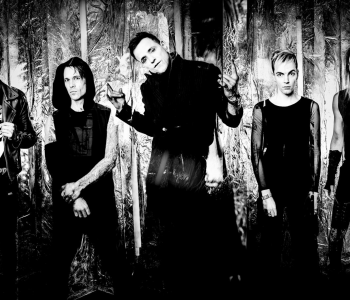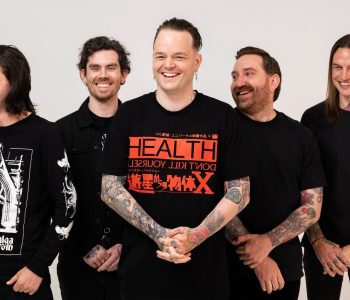Korn‘s Jonathan Davis was so excited by ORGY that he created his own record label …

In one of the better conversations about music, Marten Hagstrom, rhythm guitarist for Meshuggah shares his experiences with recording their new album Immutable.
MORE: FANGZ: Our Top 5 Bands Playing Halloween Hysteria // FROM CRISIS TO COLLAPSE: Talk Us through Their Essential Deserted Island Albums REVIEWS: KORN: Requiem // GHOST: Impera // DREAM WIDOW: Dream Widow // NERDLINGER: Hollywood Ritz // PUP: The Unraveling Of PUPTheBand // MESHUGGAH: Immutable
HYSTERIA: The concept behind a number of the songs on Immutable seems to be centered on the capability of the human race to be destructive, to both ourselves and each other. Did the world events over the past few years, be it the pandemic or global political instability, have any influence on the concept for this album?
Marten: Quite a lot actually. Normally we have a lyrical concept for our music and more often than not it is concerned with the human condition. What are we like as a species? And how do we work on an individual psychological level? We are a band who have always been into these sorts of topics. Naturally, the recent global events, which include the pandemic, play into our lyrical style. There has been so much to draw on for inspiration. I would say that the whole state of the world recently, and how it has fundamentally influenced this album both lyrically and musically, is going to become more evident as time goes on.

The way you have written the lyrics to Immutable means they are not dated in time. The human condition you speak of is perpetual, and therefore in a way, you guys have created a timeless record. This must be close to your heart because you wrote a lot more of the music for this record, correct?
Marten: To give a bit of context, the way things work in our band is that Tomas [Haake] (drummer) is the prolific lyrical contributor. We have known each other since we were six years old, and therefore we have the same background in regards to what we have read and what we have grown up on. For this reason, there is a lot of crossover in regards to the things that inspire us lyrically. Tomas is one to really rework a song’s lyrics. He may have lyrics written down in 10-20 different places that he revisits and pieces together. This goes back to that notion of timelessness that you raised earlier, because some of the lyrics on Immutable were written, for instance, 6 years ago, whereas others were written specifically for the record. In saying this however, even though Tomas and I share similar views on life and the world, we write lyrics quite differently. For me, I have to have a theme that immediately grabs my attention and inspires me to write at that moment. It usually comes when I believe that the theme that has struck me would go well with a song that I have music for, or one that we are working on. On this album, I wrote lyrics for 3 of the songs. The album has 13 tracks, but only 10 have lyrics. The reason I had more lyrics to write this time around was because there was just so much more to draw on for inspiration.
The title of the album, Immutable seems to be equally in reference to the never changing human condition, as well as your purpose and intention as creative forces in Meshuggah. You guys have never been ones to fall in line with convention; you very much run your own race. From where you guys began to where you are now, your growth and ability to push your sound into new areas is staggering from album to album, and to your credit, the records always sound like Meshuggah. What does Immutable in the context of your music mean to you as an artist?
Marten: Exactly that, actually – spot on! First of all, it is a brushing commentary on the lyrical content and our humanity, and how it changes, but never really does in a sense. Despite how far we have come in 2022, we are still facing the same problems that have plagued us since the dawn of existence, just in a different setting. The notion of Immutable is quite paradoxical to me. We’ve never been concerned with anything apart from our own creative process, but in the same breath, there are so many different incarnations of our band. Meshuggah the experimental band, Meshuggah the progressive weird band. This has been the challenge and the interesting part of playing in this group. How do you keep a sound for over 30 years and have a consistent thread on how you write new songs, whilst still shining a little bit of a new light every time you put out an album? That is the aspiration; that is being Immutable. We’re the same guys as 30 years ago, and we are still doing our thing.
The notion of being Immutable really resonates with me because your sound has developed so much over the years. On this particular album, it feels like you guys were quite open to experimenting with dynamics, tempos and melody. Traditionally, your songs have been built primarily on rhythmic patterns and vocal phrasing, but I hear a lot more melody coming through on Immutable. Examples that come to mind include the melodic tendencies in Ligature Marks and the clean guitars in They Move Below. Where did the influence to work with more melody and greater contrasts in dynamics and tempos come from?
Marten: It was deliberate. There has always been a focus on the rhythm and the vocal phrasing of Jens, like you said; these have been the primary drivers of our songwriting. In saying this however, there have always been bits and pieces in our music where we have injected melody. We have done so to make the music sound a little more atmospheric, feel a little more warm. I have been contributing a lot to that.
For as long as the band has been around, the songwriting process has always been ‘throw it on the table’. From here, we all give feedback and tighten the music up; everyone has their say on what does and does not end up as part of the song, not just the person who wrote it. This time, it was an outspoken goal to challenge this convention. This time around, we selected songs that had the potential to be great and just went with them. We didn’t overwork the songs or pick them apart. What it boiled down to was, is this song good, or is it not? If it was, we worked on it relentlessly and saw it all the way through. It was a philosophical standpoint that we have been wanting to take for a long time but we never got around to it because it was never something we usually did; we always reverted back to our modus operandi. The only other time we ever took this method was when recording Catch Thirtythree. As a band, this is by far the most gratifying album we’ve been a part of creating. We aimed for that free-spiritedness on this record. If you don’t like it, then you can blame me for it, because I am much more of a melodic writer than the other guys.
How do you keep a sound for over 30 years, whilst still shining a new light every time you put out an album? That is the aspiration; that is being Immutable.
[ Mårten Hagström ]
Everything that you guys do on your albums seems to be deliberate and thought out, from the song structures, to the instrumentation and the lyrics as well. I can hear this very clearly on Immutable, with the best example I can think of being the opener, Broken Cog, which feels very much like it was written to be an opening song. Similarly, the instrumental tracks They Move Below and Past Tense feel like intervals between really intense songs. When you are writing, are you consciously aware of where a particular song fits into the overall concept of the album, or does that come later once the songs are written?
Marten: I wrote Broken Cog, so I can speak for that one. Apart from Catch Thirtythree, we never had an album where the song order dictated itself as it was being written. That happened naturally for Immutable. I wrote Broken Cog with the idea in mind that it would be the first track. Broken Cog for me is an atmospheric starting point that breathes unpredictability, because after that track you have no idea where the album is going to go, which is what we were intending. To your point, Past Tense was moved from being in the middle of the album to the end of the album, because those were the only two spots where it made sense. When They Move Below was written, I knew that this song could not be at the start of the album, and neither could it be at the end, because it would drone on too much if it came in after 50 minutes of music. So myself and Tomas discussed the track listing for Immutable when we only had skeletons for songs, long before the final versions were finished. We placed a lot of emphasis on this part of the writing process, I’m glad you picked up on it!
Talk me through the band’s decision to record Immutable at Sweetspot Studio in Sweden.
Marten: The reason we selected Sweetspot to record was because Rickard [Bengtsson] is a friend of Dick [Lovgren] (bass player), and he has been running the studio for a long time. When you are an older band, it is important to ask yourself what is important to you. To us, more melody and more dynamics was important, and therefore we wanted a style of production that would help emphasise these elements. We felt that Rickard was the right guy; not in the sense that his studio had the best acoustics or a particular type of speaker, but from a philosophical standpoint. He is the same age as a lot of us (50’s) and has been around for a long time. He made us think about how we could best approach the record philosophically, and this is the reason we got a lot more low end on the album. We took away a lot of the shrill, high-mid production that has become the standard approach in metal these days; simply cranking everything up as far as you can in an effort to achieve power. But we felt our strength was being an older band, being seasoned and playing live shows. People always say we sound better live, so we asked ourselves, what is it about the dynamics of seeing a band play live that sounds so much better? I would say that the most rewarding and gratifying part of the recording process happened at Sweetspot with Rickard and the other guys working there. We had an open ended deadline, which was deliberate. We wanted to replicate the process from Catch Thirtythree. We wanted to go in with some ideas for songs and then develop them through the recording process, without looking at when we had to be finished. That made it a more deliberate, more mature and more rewarding process. That philosophical discussion was the most important and different element to what we normally do for an album; much more important than the studio techniques used.
You worked with Vlado Meller who did the mastering for Immutable. What was his contribution to the sound of this record? From what I can hear, he seems to have been able to perfectly capture the unhinged energy of your playing, and bring it all together in that tight and polished studio finish without compromising on the rawness of your sound. The record has that live unpredictable feeling.
Marten: Less digital.
Correct.
Marten: If I’m not mistaken, the idea to use Vlado Meller was suggested by Rickard Bengtsson; the manager of Sweetspot Studios where we recorded the album. Rickard was trying to get an understanding of what we wanted the album to feel like, not what we wanted it to sound like. Because music is about feeling and emotion, not what a particular snare drum sounds like. We initially had a bunch of different mastering options, so what Rickard did was he provided us with a few suggestions of who he believed would be best to work with us on this album. Vlado took the cake by far! Besides making sure everything sounded great and our dynamics were on point, the most important thing he did was that he discussed with Rickard how the mix was going to be set up. If you listen to this album in comparison to our other albums, this one is more placed out in the mix. The result is that you can actually hear where the individual instruments are coming from; it is not just this piece of power that hits straight down the middle, it’s a more stereo sound.
Yes! I definitely picked up on this. I believe I have heard it being referred to before as audio imaging, where you hear the music as if it was being played right in front of you. Vocals on the left, drums on the right, bass slightly off centre, and so on. With a lot of metal these days, it is produced to within an inch of its life and the sound hits you from one angle only.
Marten: Exactly! You need to push the music as far as you possibly can in the mastering phase in order to get that radio friendly sound, and everything is pushed to the ceiling the whole time. This type of production does have its merits though. For instance, if these songs from Immutable were to sound like ones from Chaosphere, that sort of production makes sense because they are supposed to sound over the top. For the songs on Immutable, where there is more melody, more warmth and more dynamics to them, and the fact the album is slower than normal for us, the production we did on this album lends itself to the maturity of the song writing. It’s still metal, but it felt like a suitable time to go into those sorts of areas, and Rickard was the perfect guy to get this out of us. He understood what he needed to do to make it work. And Vlado was the perfect guy to master it because with his experience, he was able to take us to a different sonic level without compressing the shit out of it.
I listened to an interview that Thomas [Haake] did where he spoke about your songwriting process, and how you need to designate distinct blocks of time to write songs, rather than doing it whilst touring and playing shows. Explain that for me.
Marten: Like you said, apart from the few song ideas that we have on voice memos, or riffs we come up with once in a blue moon during soundcheck, for us it has always been about touring when you are touring, and writing when you are writing. When you write, that is supposed to be a journey, not something you came up with after having a couple of beers during rehearsal. For Meshuggah, it has always felt natural for us to create a little bubble to get us into that songwriting mindset and block out the rest of the world. Then, we come out the other side with material that is good enough to record.
The philosophical discussion was the most important and different element to what we normally do for an album; much more important than the studio techniques used.
[ Mårten Hagström ]
You guys have been making records for decades now. Does the songwriting process get any easier, or harder?
Marten: I’ve been asked similar questions a lot over the years. Have we painted ourselves into a corner? Do we go into writing a new album with the goal of topping ourselves? For me personally, because I don’t want to speak on behalf of the other guys regarding what they feel like, when I sat down to write the material for Immutable in my home studio, it felt easier this time around. I never worked as much as I did on this album, nor strained myself as hard during the writing process. But, having said that, the pandemic period lent itself to brewing a cup of coffee and sitting in the studio for 12 hours. You couldn’t do much else anyway. In the same breath, with each new release, the bar obviously gets raised. With the music I write personally, I tend to scrutinize it more now. I’m sure that if I had given away the riffs I scrapped to other bands, they would be over the moon. The standard for me is whether the music that I write feels fresh enough, but still fits within the confines of what Meshuggah is. But, with this album there was also a deliberate stance from me to not make it sound like too much of a ‘jerk off’. I didn’t want the album to be a circus act where we try and do the trickiest stuff possible; when you’re 50, that is no longer the focus, which is really cool. The focus changed to how I can write Meshuggah songs with all the weirdness and unpredictability of what’s supposed to be there, but also writing tracks where people who did not originally get into our music, can actually absorb and enjoy it. This is never at the expense of being interesting, which a true Meshuggah production always is.
I think you guys are hitting the mark well. My brother only ever really enjoyed the song Rational Gaze from you, but he loves the new album!
Marten: That is really cool! That is actually something we hoped for.
Conscious of time, I’ve got two final questions? Are you coming to Australia soon? And what song from the new album are you most looking forward to playing live?
Marten: The pandemic has thrown quite a few wrenches into the mix, because there is such a backlog of tours that should have gone on the road two years ago. In saying that, I know from talking to our booking agent that there are discussions with some Australian promoters to figure out different looks on how we can come down under again. I just don’t know what periods are being discussed and how we would go about doing it, but we would definitely love to. We love coming to play there, and the times we have previously toured around Australia have been really cool; apart from the jetlag of course.
In regards to what song I am looking forward to playing, I’d say anything we chose to play. I understand that is an open-ended and very lame answer but it’s actually true. The thing that can be horrendous but also quite pleasing is to bring a new album on the road and see how it works out in a live environment. Sometimes songs you think are going to go down well, even though they ultimately work, don’t really take off. On the other hand, another track that you did not plan on playing much, turns out to be the song that really moves the crowd. Therefore, playing live is going to be an experiment of what songs really work. The two songs that I can say confidently that we will be playing are Broken Cog and The Abysmal Eye. I think we are going to do 4 tracks off the new album to start out, and see how we go from there.
Perfect, we will see you in the front row when you come down!



